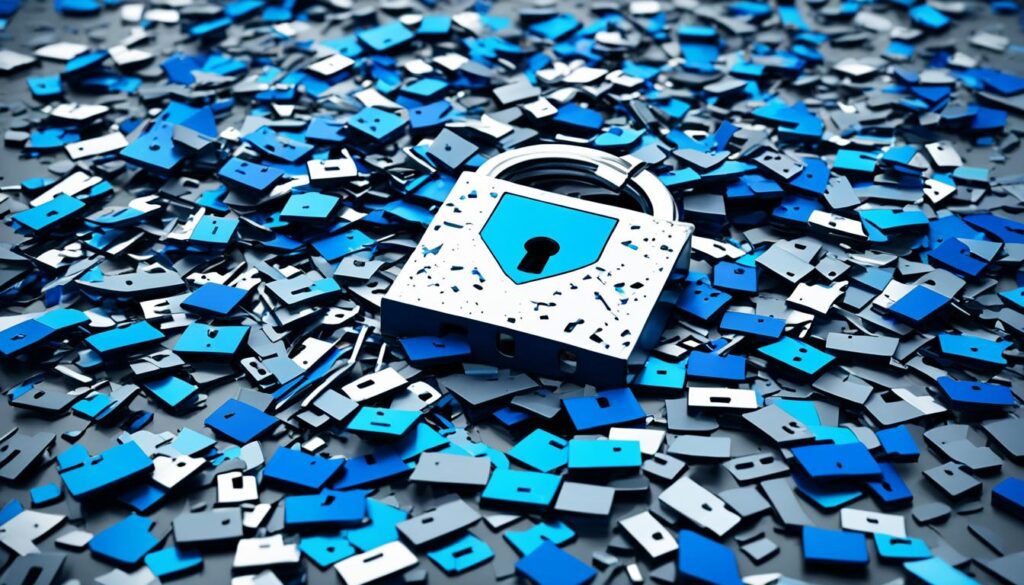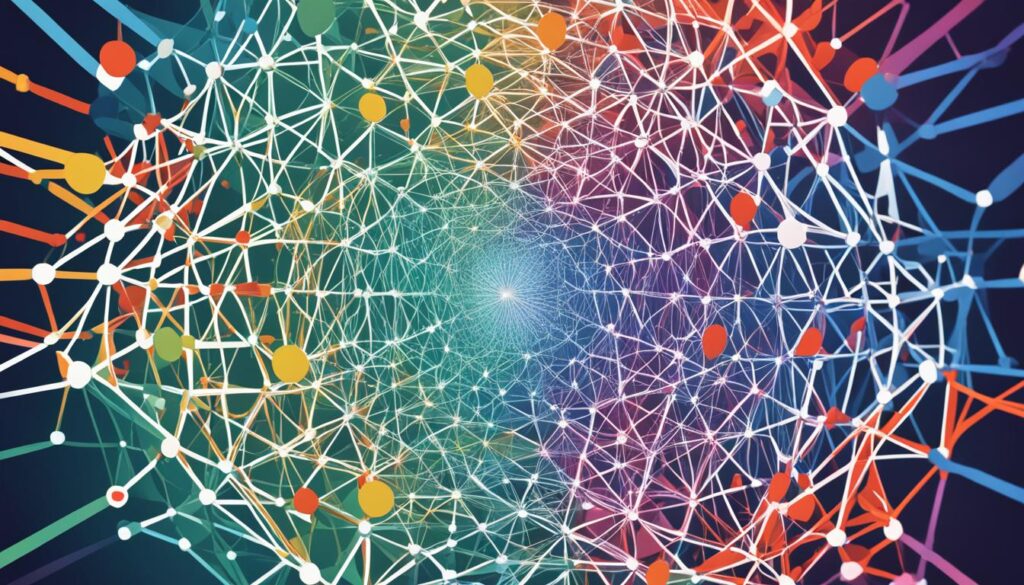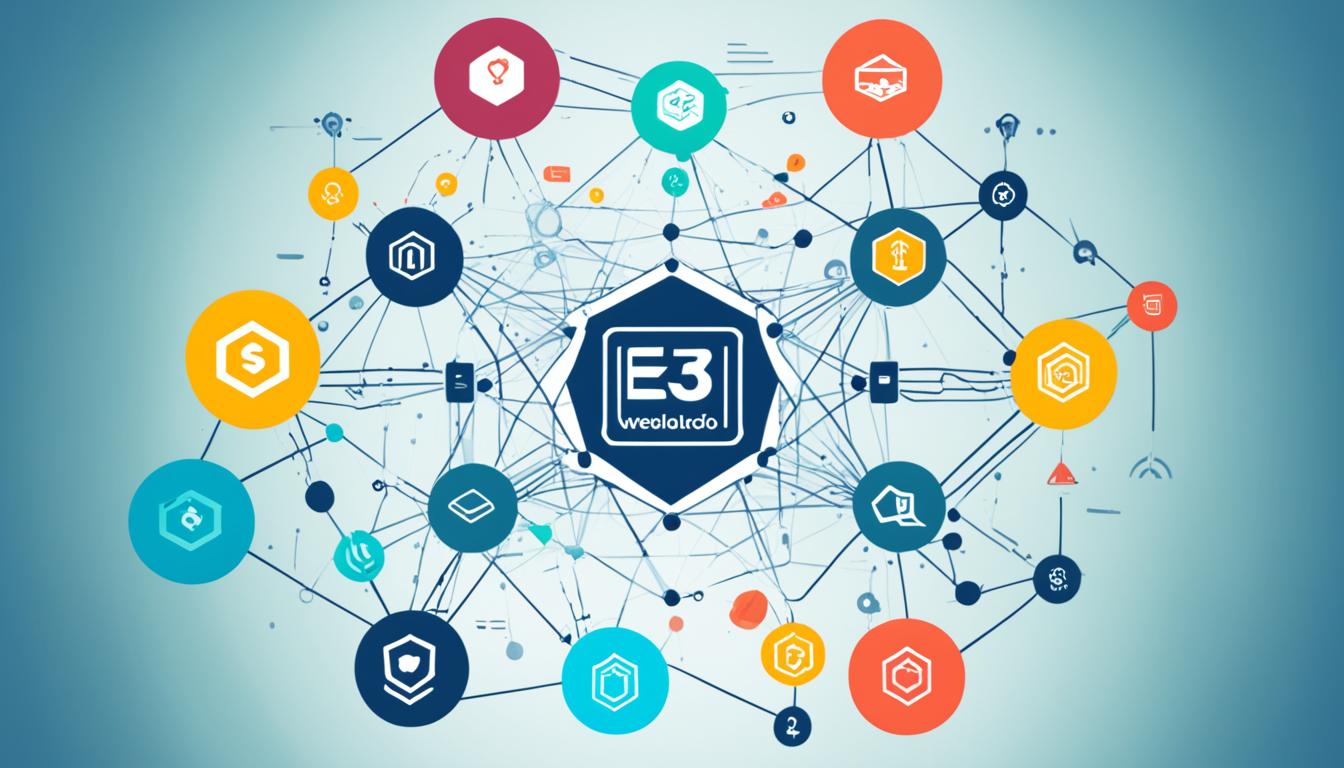Welcome to the era of Web 3.0, where the promise of decentralized identity and data management is revolutionizing the way we interact with the internet. In this new paradigm, powered by blockchain technology, users have greater control over their digital identities and personal information, ensuring enhanced privacy and security. Let’s explore how this transformative shift is reshaping the digital landscape and empowering individuals in the process.
Key Takeaways:
- Web 3.0 leverages blockchain technology to offer decentralized identity and data management.
- Decentralized identity empowers users with self-sovereign identities, enhancing privacy and security.
- Users have control over their personal information, reducing dependence on third parties.
- Decentralized identity enables interoperability and portability across platforms.
- Potential applications of decentralized identity span sectors like finance, healthcare, government services, and e-commerce.
The Problem with Centralized Identity
In the current Web 2.0 era, the internet heavily relies on centralized identity systems, with entities such as social media platforms and banks managing users’ identities and personal data. However, this centralized model poses significant challenges and concerns.
- Privacy Breaches: Centralized identity systems are more susceptible to privacy breaches, with large-scale data leaks becoming increasingly common. Users’ personal information can be compromised, leading to potential identity theft and other security risks.
- Data Mismanagement: Centralized platforms face challenges in effectively managing and securing vast amounts of user data. Unauthorized access, mishandling of data, and inadequate security measures can result in data loss, manipulation, or unauthorized sharing.
- Censorship: Centralized identity systems grant organizations the power to moderate and control user-generated content and expression. This can potentially lead to censorship, limiting freedom of speech and expression.
- Identity Theft: Centralized repositories of personal data become attractive targets for identity thieves. Security breaches can expose sensitive information, making users vulnerable to identity theft, fraud, and financial loss.
- Security Breaches: Centralized identity systems concentrate vast amounts of personal data into a single point of failure. If breached, it can have severe consequences, affecting not only individuals but also businesses and organizations.
The concentration of power in the hands of a few profit-driven corporations raises concerns about security, privacy, and data protection. The need for a more secure and user-centric approach to identity management has become crucial in the digital age.
“Centralized identity systems grant organizations the power to moderate and control user-generated content and expression.”

The Decentralized Revolution
Web 3.0 brings a revolutionary shift by introducing decentralized identity. Built on blockchain technology, decentralized identity offers self-sovereign identities that users control without the need for intermediaries. Imagine a digital wallet secured by blockchain and protected by private keys, holding your personal information and identity credentials. This user-centric approach challenges the centralized authority of Web 2.0 and provides a more secure and privacy-focused solution.
Decentralized identity empowers individuals to take control of their digital presence and personal data. With blockchain technology at its core, decentralized identity eliminates the need for third-party intermediaries and gives users the ability to manage their identity directly. By leveraging cryptographic mechanisms, decentralized identity ensures data integrity, privacy, and security.
Through decentralized identity, users can establish and manage digital identities that are immutable, tamper-proof, and portable across different platforms and services. By eliminating centralized data repositories vulnerable to hacking and data breaches, decentralized identity safeguards personal information and mitigates the risk of identity theft.
One of the key advantages of decentralized identity is the user-centric approach, which prioritizes the control and autonomy of individuals over their personal data. Users can decide when and with whom they share their information, enhancing privacy and ensuring that personal data is not exploited for profit.
Moreover, decentralized identity enables seamless and secure interactions between users and online services. By eliminating the need for usernames and passwords, which are often shared and prone to security vulnerabilities, decentralized identity offers a more robust authentication method. Users can access multiple services with a single set of credentials, reducing friction and enhancing user experience.
“Decentralized identity shifts the power from corporations to individuals, giving users full control over their personal data and online interactions.”
The adoption of decentralized identity has the potential to reshape various industries, from finance to healthcare and beyond. In financial services, decentralized identity can streamline onboarding processes, reduce fraud, and enable more efficient cross-border transactions. In healthcare, patients can have complete ownership and control of their medical records, enhancing privacy and facilitating seamless data sharing between healthcare providers.
Table: Industries Impacted by Decentralized Identity
| Industry | Potential Benefits |
|---|---|
| Financial Services | Streamlined onboarding, reduced fraud, efficient cross-border transactions |
| Healthcare | Enhanced privacy, seamless data sharing, patient control over medical records |
| E-commerce | Secure and streamlined user authentication, personalized experiences |
| Government Services | Efficient identity verification, reduced bureaucratic hurdles |
Decentralized identity is poised to revolutionize the digital landscape, ushering in a new era of user empowerment, privacy, and security. By leveraging blockchain technology and adopting a user-centric approach, decentralized identity provides individuals with the ability to take control of their digital lives and protect their personal data.
Through enhanced privacy, reduced dependency on intermediaries, and increased security, decentralized identity paves the way for a more transparent and trustworthy digital ecosystem. As we embrace this decentralized revolution, we can look forward to a future where individuals have the freedom to navigate the internet with confidence, knowing that their personal information remains in their hands.

Benefits of Decentralized Identity
Decentralized identity brings several significant benefits. One of the key advantages is enhanced privacy. With decentralized identity, users have control over what personal information they share and with whom, reducing the risk of privacy breaches. By leveraging blockchain’s cryptographic security measures, decentralized identity also enhances overall security and protects against identity theft.
Another advantage of decentralized identity is the reduced dependence on third parties for identity verification. This empowers users and eliminates the need for intermediaries, giving individuals more control over their identities and personal data.
Interoperability is another essential feature of decentralized identity. It allows users to use their decentralized identity across various services and platforms, making it more convenient and efficient. This interoperable nature enables seamless interaction between different applications and systems.
Additionally, decentralized identity offers portability, giving users the ability to take their identities with them when switching services or platforms. This portability simplifies the identity management process and facilitates a smoother transition between different digital experiences.
In summary, decentralized identity provides enhanced privacy, improved security, reduced dependence on third parties, increased interoperability, and convenient portability.

| Benefits | Description |
|---|---|
| Enhanced Privacy | Users have control over personal information shared |
| Improved Security | Blockchain technology protects against identity theft |
| Reduced Dependence on Third Parties | Users have more control over their identities without intermediaries |
| Interoperability | Decentralized identity can be used across various services and platforms |
| Portability | Users can take their identities with them when switching services or platforms |
The Future of Decentralized Identity
The potential of decentralized identity extends beyond personal use. In the future, we may see decentralized identity disrupting various sectors, including financial services, healthcare, government services, and e-commerce.
Decentralized identity has the power to revolutionize customer onboarding in the financial services sector, reducing fraud and simplifying cross-border transactions. By leveraging blockchain technology, financial institutions can enhance security while providing a seamless and user-centric experience for their customers.
In healthcare, decentralized identity offers patients complete control over their medical records. With decentralized and secure access to their health information, patients can navigate the healthcare system more efficiently while ensuring the privacy and confidentiality of their sensitive data.
“Decentralized identity streamlines government services and reduces bureaucratic hurdles.”
Government services can also benefit from decentralized identity, as it has the potential to streamline processes and reduce bureaucratic hurdles. By implementing decentralized identity systems, governments can enhance efficiency, improve data management, and offer citizens seamless access to government services.
E-commerce platforms stand to gain from the integration of decentralized identity as well. By providing users with self-sovereign identities, e-commerce platforms can offer seamless login experiences while ensuring secure data management. Users can enjoy personalized shopping experiences while maintaining control over their personal information.
As decentralized identity continues to evolve, the opportunities for its application in financial services, healthcare, government services, and e-commerce are vast. Embracing this innovative technology can lead to a future where user empowerment, privacy, and security are at the forefront of our digital interactions.

Stay tuned for the conclusion of this article, where we will recap the key insights and discuss the overall impact of Web 3.0 and decentralized identity.
Conclusion
Web 3.0 and the promise of decentralized identity offer a brighter future for users in terms of privacy, security, and control over personal data. By shifting away from centralized identity systems, Web 3.0 empowers users with self-sovereign identities secured by blockchain technology.
Decentralized identity brings enhanced privacy, security, reduced dependence on third parties, interoperability, and portability. Users have full control over what personal information they share and with whom, reducing the risk of privacy breaches. The use of cryptographic security measures provided by blockchain technology enhances the overall security of user data, protecting against identity theft and ensuring data integrity.
Moreover, the potential applications of decentralized identity are vast, spanning across sectors such as finance, healthcare, government services, and e-commerce. In the finance industry, decentralized identity can revolutionize customer onboarding, reduce fraud, and simplify cross-border transactions. In healthcare, patients can have complete control over their medical records, improving security and efficiency. Decentralized identity also holds the potential to streamline government services and eliminate bureaucratic hurdles. E-commerce platforms can benefit from seamless login experiences and secure data management through decentralized identity.
As we embrace the decentralized future, we can look forward to a more user-centric digital world where data protection and individual control take center stage. With Web 3.0 and decentralized identity, users are empowered to safeguard their privacy, maintain data security, and have greater control over their personal information.
FAQ
What is Web 3.0 and decentralized identity?
Web 3.0, also known as the Decentralized Web, introduces decentralized identity, where users have control over their identities without relying on intermediaries. It leverages blockchain technology to enhance privacy, security, and user control over personal information.
What are the challenges with centralized identity in Web 2.0?
Centralized identity in Web 2.0 poses challenges such as privacy breaches, data mismanagement, censorship, vulnerability to identity theft, and security breaches. The concentration of power in the hands of a few profit-driven corporations raises concerns about security and data protection.
How does decentralized identity revolutionize the digital landscape?
Decentralized identity, built on blockchain technology, empowers users with self-sovereign identities. Users have control over what personal information to share, reducing the risk of privacy breaches. It eliminates the need for intermediaries, enhances security, and allows for interoperability across platforms.
What are the benefits of decentralized identity?
Decentralized identity offers enhanced privacy, as users have control over their personal information. It improves security by leveraging blockchain’s cryptographic measures, protecting against identity theft. Users no longer depend on third parties for verification, and decentralized identity can be used across various services and platforms, making it more convenient and efficient. It is also portable, allowing users to take their identities with them when switching services or platforms.
How can decentralized identity impact different sectors?
Decentralized identity has the potential to disrupt sectors such as finance, healthcare, government services, and e-commerce. It can revolutionize customer onboarding in financial services, reduce fraud, and simplify cross-border transactions. In healthcare, patients can have complete control over their medical records, enhancing security and efficiency. Government services can be streamlined, reducing bureaucratic hurdles. E-commerce could benefit from seamless login experiences and secure data management through decentralized identity.
What does the future hold for decentralized identity?
Decentralized identity represents the future of web interaction, offering users greater privacy, security, and control over personal data. As we embrace the decentralized future, we can expect a more user-centric digital world where data protection and individual control take center stage.








